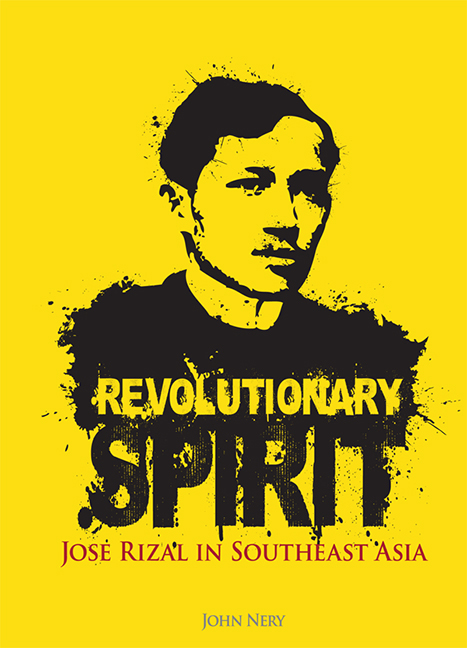Book contents
- Frontmatter
- Dedication
- Epigraph
- Contents
- Foreword
- Message
- Preface
- Acknowledgements
- INTRODUCTION The Uses of Error A Rizal Chronology
- 1 TURNING POINTS
- 2 “THE VERY SOUL OF THIS REBELLION”
- 3 DOCTOR RIZAL
- 4 “HALFBLOED”
- 5 “NO MARX OR LENIN”
- 6 UNDER THE SOUTHERN SUN
- 7 THE HOPE OF MILLIONS IN ASIA
- 8 “HIS NAME IS SWEET IN OUR MEMORY”
- 9 THE MYTH BUSTERS
- 10 “A GREAT HISTORICAL EXPERIMENT”
- Epilogue
- Appendices
- References
- Index
8 - “HIS NAME IS SWEET IN OUR MEMORY”
Published online by Cambridge University Press: 21 October 2015
- Frontmatter
- Dedication
- Epigraph
- Contents
- Foreword
- Message
- Preface
- Acknowledgements
- INTRODUCTION The Uses of Error A Rizal Chronology
- 1 TURNING POINTS
- 2 “THE VERY SOUL OF THIS REBELLION”
- 3 DOCTOR RIZAL
- 4 “HALFBLOED”
- 5 “NO MARX OR LENIN”
- 6 UNDER THE SOUTHERN SUN
- 7 THE HOPE OF MILLIONS IN ASIA
- 8 “HIS NAME IS SWEET IN OUR MEMORY”
- 9 THE MYTH BUSTERS
- 10 “A GREAT HISTORICAL EXPERIMENT”
- Epilogue
- Appendices
- References
- Index
Summary
On 20 May 1962, on the anniversary of the founding of the Budi Utomo — for Sukarno the true beginning of his country's nationalist movement — the self-styled “Mouthpiece of the Indonesian People” tore into the Dutch, the country's former colonial masters, again. Sukarno criticized the Netherlands for reneging on its promise to resolve the West Irian dispute within a year after recognizing Indonesian sovereignty in 1949. He announced, again, his government's new policy of liberating West Irian (“before the cock crows on the 1stof January 1963”), if diplomacy failed one final time. And he deployed his iconic army of famous trouble-making nation-makers, again.
Jose Rizal, for instance.
And I also ask the United States of America, is it true if people say for instance, that the independence of the Philippines was the result of the trouble maker Jose Rizal Y Mercado, or Aguinaldo. No!
That movement was not made by Aguinaldo or Jose Rizal Y Mercado, but it was the movement of history [Sukarno 1962: 6; the capitalized “Y” is in the official English translation].
The particular use of Rizal in this speech, or indeed of Aguinaldo and other pioneers of nationalism, is unusual. Instead of direct praise, or a reference to them as inspiration or source or cause of the nationalist movement, as was his usual practice, Sukarno negates their role — in favour of historical forces. It is a subtle change, but in fact the effect is not negative. The listener does not hear the language as a putdown; the leaders remain singular, attention is directed to them, and their purpose, as always, is to serve as a reflection, or a reiteration, of Sukarno. It is Sukarno who has been accused of mischief-making.
Except for this subtle inversion, the speech Sukarno gave at the commemoration of “National Reawakening Day” in 1962 to a mixed audience (mostly local, but with the diplomatic corps in attendance) at the Negara Palace is a characteristic if late example of his powerful oratory. Rosihan Anwar has argued that “one cannot deny the substantial role played by President Sukarno” in popularizing Rizal's name in Indonesia (Rosihan 1961: 298); for that reason, we must take a closer look at Sukarno's influential speechmaking.
- Type
- Chapter
- Information
- Revolutionary SpiritJose Rizal in Southeast Asia, pp. 172 - 189Publisher: ISEAS–Yusof Ishak InstitutePrint publication year: 2011



